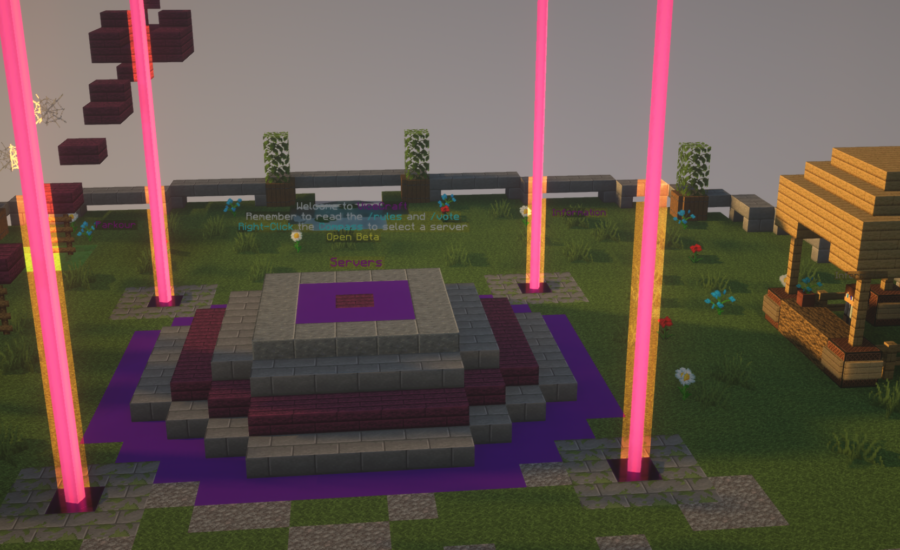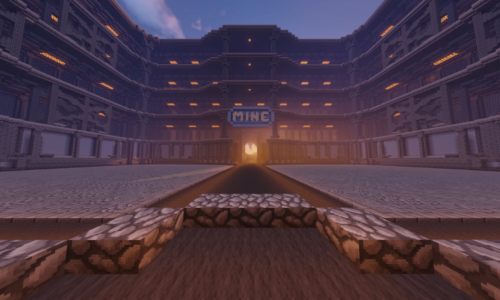Wandersong is alright. I don’t think I’m its intended audience, though. I think I might be getting old, losing touch with the Things The Kids Care About Now. I might also be in the middle of a mid-life crisis. I don’t know for sure, I’ve never had one of those before. I’m not done with it yet (the crisis or the game), but there are just a lot of things that are really bugging me that I have to get off my chest.
The game has pretty solid writing (in the style of Night In The Woods’ super-casual internet-style dialogue, “yeah get it girrrrrl”) and the quest is a fun (if a bit unoriginal) subversion of RPG tropes (though they’ve been lampshaded and put through so many permutations so often that I have to wonder if they’re even “tropes” at this point). The characters have charm, and there are definitely some funny moments.
The music is serviceable, though as a composer myself I have some issues with some of it. The melodies lack focus, and often don’t resolve to the tonic or repeat any bars (unless it’s two-note back and forth repetition for far too long). Is this intentional? It would be thematically appropriate for the music to wander without proper resolution. But some songs that I can tell are supposed to be impactful lose their power when they just kind of… end on some weird note and fade away. Other aspects of the presentation indicate to me that the song was intended to be moving and powerful, but I was not moved. Not by the music, anyway. There are some genuinely moving moments that come across in the writing and the lyrics of these songs. But the music can’t support them. All of the songs are just these meandering, directionless pieces that lack any real hooks or development. I saw the soundtrack praised all over the place before playing, and I really just don’t get it. I think people are conflating the lyrics (which are generally pretty okay) or the gameplay scenarios (which can be cute and silly) with the quality of the composition. The choices being made are baffling, musically speaking. There’s not even a discernible key or scale to these pieces. The Wandersong OST is to music what the Marvel movies are to film: a series of images in sequence that kinda resembles a movie but which on closer examination is in no way coherent. (no but see it’s deep and prog and you just don’t get it, I’m in the mixolydian antipodean wanderean mode, that’s why my I-flat VII-III-VI-flat VI-II progression is lit fam)
There’s also an issue that arises when the cue for notes to play comes actually ON the downbeat. The Overseer songs show you in advance what notes to play (though the Switch right analog stick is poorly suited to playing the notes accurately, it turns out), but other moments, such as the coffee pirate song, or the Earthsong moments, don’t give you the notes in advance. So you’re forced to stumble through, herky-jerky, about a quarter-beat behind the beat. This is enough to suck the fun and emotional impact out of any song. (no but see it’s like a metaphor for how i don’t know what i’m doing)
There are also some fairly serious audio balancing issues, which, for a game centered around music, is aggravating. There are times when you can’t hear the notes the bard is supposed to be singing and they just get swallowed up in the mix. This is particularly egregious in Act 2. And the Humble Bundle logo screen is about a thousand decibels louder than the rest of the game.
The puzzles are okay. They’re incredibly simple, but I get it. That feels deliberate. It’s fine, you know? It’s fine.
Basically, this game is pretty okay. So, why was everyone telling me this game is the “cure for cynicism” and the best thing ever and a must-play?
I think a lot of it has to do with the cultural zeitgeist or whatever. We live in a world that actually is coming to an end, thanks to climate change, and the powers that be are fucking off doing nothing about it or actively working to hasten it for really stupid reasons. So that fits. The game also features a lot of characters without much going on in their lives, people questioning their purpose, unsure of their direction, people who don’t know who they are yet. People who have kind of vague unformed existential issues, but nothing mind-shattering. In other words, it’s a game for people in their 20s, who have yet to fully grasp their own mortality but still have a laundry list of unfocused fears and doubts about little things.
The message of Wandersong is that optimism and empathy are pretty cool and can save the day. So, I get it. It’s reassuring and fun and silly. I might even agree. There are some gay trolls. That’s good too. You can press the dance button even when you’re sad in Act 4, and he’ll do a very sad jig. That’s great stuff.
It bothers me that the game went out of its way to make a tortured Homestuck reference. I get that there’s fans of Homestuck out there. They exist, I’m almost certain of it, and they are VERY passionate about their very dumb thing that they like. I get it, too, because up until about act 5 or so, I was into it too. It was against my better judgement, mind, since I have issues with the story and characters that would take pages to explain (and in that respect, it would be like a single stilted conversation in Homestuck), issues which compounded and compounded until I had to just give up reading it. It just bugs me, I guess, that that story might have had some influence on the creators of this one.
It bugs me because it doesn’t bode well for the tone and aspirations of Wandersong’s world and story. It bugs me because Homestuck has absolutely terrible writing, and I’m not sure that I care about what anyone who idolizes it has to say about anything. It bugs me because it’s a reminder that people who are probably like 14 years younger than me are now at the age where they can make silly games about positivity that rehash 20 year old subversive tropes about bards and RPGs, and the culture moves so fast now that I have literally watched it come full circle within the span of my adult life and nobody whose first exposure to bard-based humor is Wandersong is going to remember the things I do. They haven’t seen the things I’ve seen. They probably like goddamn Homestuck. They probably talk exactly like the writing in games like this, they use slang I’ve never heard of and leave the periods off of their sentences. They probably empathize with the bard, or connect on some deep level with other characters in this game.
You wanna know who I connect with in Wandersong? Pretty much nobody. The Hero is a fascist, the Bard lacks confidence, Miriam is a whiner. Maybe the coffee pirates. I like coffee. Not in like a wacky way, though. I don’t constantly joke about coffee. My whole personality doesn’t revolve around it. But there you go.
Maybe it’s my own personal baggage, the timing of me playing this game, that’s fucking me up about it. Look, it’s probably a fine game. It’s fine. I don’t want to give you the wrong idea, because I am having fun with it. But I mean, this is a game wherein the main character’s crew rolls up into a factory that’s eating a town alive, and they just walk up to the guy in charge (who I guess might be Santa? it’s not clear what the intent is with that reference besides a Homestuck-style “oh man this might be deep maybe if it made any sense” way) and they just ask him to shut down the factory and he does.
There’s a line between fantasy and reality that games walk, where they have to include things that are realistic-seeming, so as to pull you in and make what’s going on relatable, without sacrificing their fantastical narratives and setting. There’s an expectation that the Orcs of Mung’St’Ench will still act in a way that’s understandable, that’s connected to our reality in some way. That’s what makes fiction work. It’s a delicate illusion. And this moment, where Maybe-Santa-Who-Cares just says “oh! sorry, I wanted to make people happy so if they’re not happy then I’ll stop being a capitalist” is the moment where Wandersong’s illusion shattered for me.
That… is not even remotely how it works. In real life, you have to hold factory owners hostage or beat them to death to get them to relinquish their grip on their profits. There’s no factory owner on the face of the earth that’s motivated by “making people happy”. They want money. And no amount of cheerfulness or singing is going to make them let go of it. They don’t give a fuck about the human cost of their enterprise. Do you think Jeff Bezos is going to shut Amazon down just because you ask nicely? Do you think he just wants to help people, that he runs his shitshow sweatshop hellhole of human suffering out of the kindness of his heart? This is fucking revolutionary tourism, is what it is. Social change doesn’t happen by singing and dancing.
And this moment right here, where Santa(?) steps down, this is why I didn’t like it when the game made a Homestuck reference at me. Because the kind of person who was influenced strongly by Homestuck, if they’re given the tools to write their own story, this is what they do. They’re going to fill it full of nonsense like this that doesn’t make any sense, and they’ll write it off as if it doesn’t matter, as if it’s a clever joke that you’re an idiot for not getting. See, because the factory owner here is actually Santa! Get it?
You know what? I don’t fucking get it. There’s nothing there to get. What possible purpose does it serve to the story, for the factory owner to be Santa? And why, if it did serve any purpose, are you being so fucking coy about it? He’s shown in profile, in shadow, like goddamn Alfred Hitchcock. And he says “So-ho-ho”. Heck off with that. If I start enumerating the ways in which this storytelling mentality spreads throughout the game, I’ll be here all day. Suffice it to say the whole thing is a house of cards. It works so long as you don’t breathe on it too hard, but upon any critical examination, it falls apart into a series of loosely-connected free-associative references. Empty signifiers piled on top of each other.
Okay, so. I’m being really harsh here. It’s not like I hate this game. Far from it, I think it’s got a lot of surface-level charm. There are some good moments. I guess I’m just repeating my mistake with reading Homestuck, sticking with it hoping it’ll improve. Or there’s something there that resonates, despite the game’s many many many faults. It’s hard to hate a game with such a basically wholesome message, it’s like criticism-proof and you look like an asshole for saying it’s bad. Which is irritating as well.
It also bugs me the way the game handles the bard being sad in Act 4. You know what game handled depression well? Night in the Woods. You know what depression isn’t? It’s not feeling vaguely sad for a bit and then being fine after one pep talk, in the space of about two hours. That, my friend, is depression tourism. It’s what people who’ve never experienced clinical depression think depression is like.
Here’s the bit where Grandma Applebaps lectures you. A lot of young people feel like they lack direction and confidence. That’s normal. They feel like they’re not special, because they’re not. It’s no great revelation that the people who think they are special, the “heroes”, have other issues and are generally jerks. That’s something we all already know. Younger people haven’t solidified as people yet, they haven’t figured out their interests or their personality. They have vague existential fears and doubts, because we live in a shitty world and they haven’t come to grips with how to navigate that or figure it out yet. Lately, economic factors have made it even harder to grow up and become independent, so people are maturing more slowly. People in their 20s, even their early 30s, struggle with feeling like children. It doesn’t help that a lot of our favorite hobbies, such as video games, are looked at by older generations as being “for kids” and have stigma associated with them.
It’s not some revolutionary idea, though, that optimism in the face of bleak reality can be helpful and healthy. It’s not revelatory or deep to say that bards can save the world, or that it’s okay to grow up at your own pace. This stuff is at the level of the basics of the basics. Raising silliness to the height of an all-powerful symbol of hope for the future is unnecessarily and inaccurately lofty.
It’s a very Homestuck kind of thing to say. It sounds cool on the surface, like as if it’s some earth-shattering new thing. “You’re not special and that’s okay!” is fine and indisputably true, but it’s also ultimately not very interesting, or even that new of a concept. Whole political systems are built on this idea as a starting point, not some final piece of the puzzle. That statement by itself is only the cobbled-together cast-off remnants of something approaching an actual life philosophy, put together by people who are too young to know any better or to know what the next steps are after that revelation. And wallowing in the kind of naïveté that thinks factory owners just want to help people, helps nobody.
Now, if you kids wanna come sit around and let me tell you about the glorious techno-anarcho-communist Utopia, that’d be just fine. We have gay space robots.
I had to get this out of my system so that I can continue with Wandersong and complete it. I’m at least partially enjoying it, and I do hope it improves. I’ll post an update with more of my thoughts once the story has had a chance to finish up and show me what it’s got.




